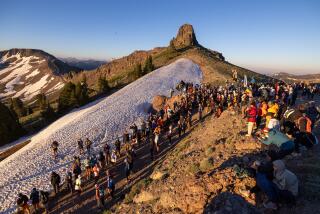Central Park Jogger Tells of ‘Wilding’ Attack Injuries
NEW YORK — The woman known as the Central Park jogger--scarred, shaky of gait but steady of speech--made her first public appearance Monday, taking the witness stand to testify against three teen-agers accused of raping and attempting to murder her during a rampage that added the word “wilding” to the national vocabulary of violence.
The 30-year-old investment banker used one hand to balance herself when she walked unsteadily up steps to the witness stand. Facial scars were visible beneath her makeup, and her right eye seemed larger than her left because of eye socket trauma.
In a firm voice, the jogger testified that her memory is blank for the period four hours before her assault through six weeks later, when she woke up in a hospital bed.
But she identified the clothing she wore on April 19, 1989, the night of her attack, and detailed the extent of her injuries--injuries so severe that she was originally not expected to live.
“Do you recall going jogging in Central Park on the night of April 19, 1989?” asked Assistant District Atty. Elizabeth Lederer.
“No, I don’t,” the woman said.
“Do you have any memory whatsoever of what happened to you in the park on April 19, 1989?” the prosecutor continued.
“No, I do not,” the witness replied.
She said her memory resumed in Metropolitan Hospital when she emerged from her coma over Memorial Day weekend in 1989.
“I remember waking up in the hospital on a Friday evening late in May and a very good friend of mine was in the hospital room and so was a nurse,” she testified.
Millions have followed the remarkable recovery of the young investment banker, who has since returned to work at Salomon Bros. Some of her co-workers came to court to encourage her Monday. The three defendants starred intently at her. She did not look at her alleged assailants.
State Supreme Court Justice Thomas B. Galligan told courtroom artists Monday not to sketch the jogger because she had shown anxiety about having her face made public after her rape. Most news organizations voluntarily have withheld her name.
The petite, perhaps 100-pound woman with short blonde hair, made her way to the raised witness stand with difficulty. As she walked into the courtroom, taking small steps, it was immediately clear that remnants of her injuries remained. A court officer grasped her elbow, steadying her, as she climbed the few low steps to the witness box.
Nevertheless, she appeared poised and professional. She wore a doubled breasted purple silk suit, tiny gold earrings and a gold necklace. The jogger said that she usually ran six or seven miles a day before her assault. She said she usually ran alone. She said she was unable to recall the time she left Salomon Bros. on the night of April 19.
When she was discovered in a puddle of blood and mud on April 20, 1989, she was barely alive. Color pictures of her severe injuries at the hands of a gang of 30 youths shown to the jury were so graphic that some jurors were barely able to look at the photos. Robert Kurtz, her physician during her stay at Metropolitan, has testified that “she hung onto life by a thread,” with her brain swollen, nearly all her blood drained, and her body jerking uncontrollably.
She said the injuries she suffered still bothered her.
“I have problems with balance when I am walking and coordination at times as I am walking down the hall or down the street,” she told the jurors who listened intently. “I’ll veer off, either to the right or to the left. I also have a great deal of trouble going down steps . . . . I also have lost my sense of smell completely . . . I also suffer from double vision.”
“Do you have any scarring as a result of what happened to you?” Lederer asked.
“Yes, I do,” the jogger said.
Article by article, Lederer displayed the clothing the jogger had worn the night of her assault and asked the witness to identify the garments.
At one point, she held up the jogger’s soiled and blood-stained shirt.
“It’s the shirt I used to wear,” the witness said. “ . . . It was white.”
Defense attorneys asked no questions during the jogger’s 15-minute appearance.
Later, outside of court, some spectators who were enraged that the jogger wasn’t cross-examined, berated the defense attorneys, shouting, “Sell Out! Sell Out!”
But Michael Joseph, the lawyer for Antron McCray, 16, defended his decision and the strategy of the other lawyers.
Noting her post-traumatic amnesia, Joseph said the jogger had provided no additional information to the jury.
“I didn’t feel it would serve any purpose whatsoever,” he said. “I felt this was a woman who should not be put through anything further . . . . We all agreed there was nothing to gain by cross-examining her.”
Robert Burns, the lawyer for Yusef Salaam, 16, conceded there was a tremendous amount of sympathy for the jogger. “You never know how a jury will react,” he said.
McCray, Salaam and Raymond Santana, 15, are charged in a 13-count indictment with attempted murder, riot, rape, assault, robbery and other crimes. Three other defendants will be tried later.
In an attempt to deflect arguments that a rape might not have occurred, Lederer asked the jogger--the prosecution’s 34th witness--whether she had engaged in sexual relations with anyone prior to the Wednesday of her attack. She testified she last had sex the previous Sunday with her boyfriend and had used a diaphragm. On Friday, Dwight Adams, an FBI expert in DNA technology testified that semen found inside the jogger did not match her boyfriend or any of the defendants.
More to Read
Sign up for Essential California
The most important California stories and recommendations in your inbox every morning.
You may occasionally receive promotional content from the Los Angeles Times.










